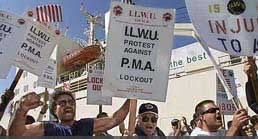The threat of a work stoppage at West Coast ports appears to growing, with talks reported to be bogged down and workers now without a contact for nearly two months.
Supply Chain Digest Says... |
 |
|
| The sides are said to be far apart on the issues of wages and use of automation at the ports. |
|
 |
|
What do you say? |
|
| Click here to send us your comments |
|
| |
|
| Click here to see reader feedback |
|
|
|
The contract between the International Longshore and Warehouse Union (ILWU), which represents 23,000 West Coast stevedores, and the Pacific Maritime Association (PMA), which negotiates for 29 port and terminal operators, expired June 30th.
It is commonplace for dock workers to stay on the job under the expired contract, but now approaching two months there is a risk negotiators on both sides will not be able to strike a deal soon, maybe leading to a labor strike instead. For example, workers may increasingly get fed up about the lack of a grievance process that allows for resolution of disputes between workers and management - which doesn’t exist without a contract.
Last week, port workers in Seattle held a meeting to prepare for possible picketing activity.
One modest threat appears to have been averted for now, as the union representing security guards at the ports of Los Angeles and Long Beach reached a tentative contract agreement this week. These workers are part of the ILWU, but on a separate contract than regular docks workers.
The concern was that if the security guards went on strike then dockworkers would refuse to cross the picket lines on principal and for health and safety reasons.
With that scenario apparently now averted, attention is back to the main negotiations, about which the Wall Street Journal reported this week that “industry officials who fear the negotiations could take months to aboubutsolve,” maybe in to 2023.
The longer the negotiations extend, the higher the probability that dock workers walk off the job. That creates uncertainty, perhaps enough for shippers to look for alternative paths, such as moving container volumes to Gulf Coast and even East Coast ports from Asia.
Although both sides have been almost totally silent on the status of the negotiations, there are reports that a tentative agreement on health and benefits changes had been achieved at the end of July.
(See More Below)
|
CATEGORY SPONSOR: SOFTEON |
|
|
|
|
|
 But the sides are said to be far apart on the issues of wages and use of automation at the ports. The wage issue is complicated by the current state of sky high inflation, while the union sees automation as a near existential issue viewed as critical by the rank and file. (See Which Side will Blink in terms of Port Automation?) But the sides are said to be far apart on the issues of wages and use of automation at the ports. The wage issue is complicated by the current state of sky high inflation, while the union sees automation as a near existential issue viewed as critical by the rank and file. (See Which Side will Blink in terms of Port Automation?)
The Wall Street Journal reports that of all things a dispute over which workers are covered by two separate unions repair and maintain equipment at a cargo-handling terminal at the Port of Seattle have held up discussions recently.
Will the US government intervene as it did last week under the threat of a crippling rail worker strike? Shipping industry officials they also want the government to get similarly involved in the port labor talks.
What are your thoughts on these negotations? Let us know your thoughts at the Feedback section below.
Your Comments/Feedback
|

